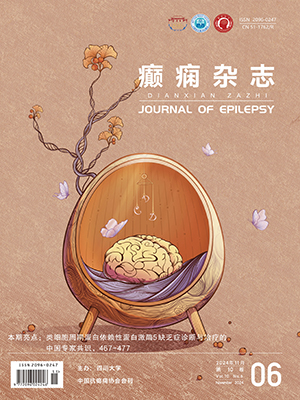| 1. |
Decety J.The neurodevelopment of empathy in humans.Developmental Neuro-science, 2010, 32(4):257-267.
|
| 2. |
Lev-Ran S, Shamay-Tsoory SG, Zangen A, et al..Transcranial magnetic stimulation of the ventromedial prefrontal cortex impairs theory of mind Learning.European Psychiatry, 2012, 27(4):285-289.
|
| 3. |
Hynes CA, Baird AA, Grafton ST.Differential role of the orbitalfrontal lobe in emotional versus cognitive perspective-taking.Neumpsychologia, 2006, 44(7):374-383.
|
| 4. |
Kalbe E, Schlegel M, Sack AT, et al. Dissociating cognitive from affective theory of mind:a TMS study.Cortex, 2010, 46(6):769-780.
|
| 5. |
Klimecki O, Leiberg S, Ricard M, Singer T.Differential pattern of functional brain plasticity after compassion and empathy training.Soc.Cogn Affect Neurosci.2013, 9(2):873-879.
|
| 6. |
胡颖, 蒋玉宝, 汪凯, 等.原发性癫痫患者共情能力的研究.中华神经科杂志, 2014, 47(8):528-533.
|
| 7. |
Salgado PCB, Yasuda CL, Gendes F, et al.Neuroimaging changes in mesial temporal lobe epilepsy are magnified in the presence of depression.Epilepsy Behav, 2010, 19(6):422-427.
|
| 8. |
Kanner AM, Balabanov A.Depression and epilepsy:how closely related are they.Neurology, 2002, 58(8):37-39.
|
| 9. |
陈葵.癫痫与抑郁障碍的临床关系.医学研究杂志, 2011, 40(11):176-178.
|
| 10. |
梁艳玲, 薛峥, 康慧聪, 等.56例成年癫痫患者抑郁、焦虑的临床评估及危险因素分析.神经损伤与功能重建, 2014, 9(1):31-35.
|
| 11. |
Grabowska-Gravb A, Jedrzejczak J, Naganska E, et al. Risk factors for depression in patients with epilepsy.Epilepsy Behav, 2006, 8(2):411-417.
|
| 12. |
赵康仁, 李学忠, 任乃勇, 等.不同发作类型癫痫患者抑郁状况及生活质量的多因素分析.江苏大学学报(医学版), 2009, 19(3):243-246.
|
| 13. |
Amlerova J, Cavanna AE, Bradac O, et al. Emotion recognition and social cognition in temporal lobe epilepsy and the effect of epilepsy surgery.Epilepsy Behav, 2014, 36(7):86-89.
|
| 14. |
Toller G, Adhimoolam B, Rankin KP, et al. Right front-limbic atrophy is associated with reduced empathy in refractory unilateral mesial temporal lobe epilepsy.Neuropsychologia, 2015, 11(78):80-87.
|
| 15. |
陈湛愔, 陈文荣, 林海峰, 等.癫痫患者人格个性因素对情感障碍和认知障影响的研究.中华行为医学与脑科学杂志, 2009, 18(10):876-879.
|
| 16. |
周文竹, 董春波, 宋凡, 等.成年癫痫患者伴发焦虑抑郁情绪及相关因素研究.医学与哲学, 2010, 31(11):56-58.
|




